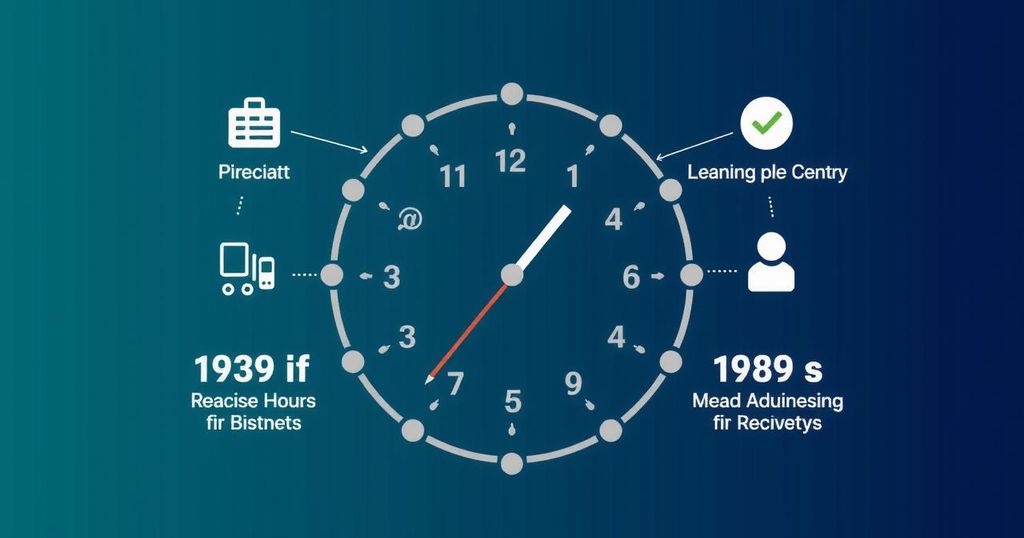Compressed hours can enhance employee productivity and satisfaction in tech companies by providing longer periods for focused work and achieving better work-life balance. While helping to reduce turnover, these hours align well with the focus-driven nature of many tech roles. Offering flexibility in work schedules may prove essential for attracting top talent in a competitive market. Nevertheless, companies must navigate challenges related to collaboration and employee preferences when implementing such flexible arrangements.
Compressed working hours present a strategic approach for technology companies to enhance productivity, improve employee satisfaction, and reduce turnover rates. By defining compressed hours as completing the same workload over fewer days—with longer shifts—companies can reap significant benefits, particularly in a sector that values flexibility and innovation. Alastair Brown, CTO of BrightHR, emphasizes that implementing compressed hours often leads to increased job satisfaction, as employees gain additional time off. This extra day off not only fosters a better work-life balance but also enhances overall performance as employees become increasingly focused and efficient during their work hours. In addition, the framework of compressed hours complements the ‘sprint’ methodology in project management prevalent within the tech industry. Brown notes that the structure of sprints aligns well with the concentrated work required in tech roles, allowing employees to leverage intense focus during longer working hours while benefiting from adequate rest periods. Consequently, this approach may help mitigate burnout—which is a common concern in high-demand environments. Furthermore, compressed hours contribute to reducing employee turnover and absenteeism—a notable challenge in tech. According to Brown, employees are less likely to take sick leave or pursue alternative employment when they perceive a favorable work-life balance. Providing staff with the flexibility of compressed hours may offer a competitive edge in attracting and retaining talent, particularly in a market where flexibility is increasingly prioritized. Adam Levine of InnerXLab supports this, stating that roles requiring deep concentration, such as software development, flourish under compressed schedules due to extended uninterrupted periods dedicated to complex tasks. While there are numerous advantages associated with compressed hours, challenges also exist. The tech sector relies heavily on teamwork, and any shift to compressed hours may disrupt collaborative efforts. Roles like customer support, which necessitate continuous availability, might require careful scheduling to avoid service gaps. Additionally, it is critical that companies provide this option voluntarily rather than mandating it for all employees, as not every individual thrives in a longer hour environment. When comparing compressed hours to the four-day work week, it is important to recognize the distinction in how each structure manages hours. A four-day work week typically reduces hours while maintaining pay; whereas compressed hours require the same amount of work to be completed across fewer days. Each model may have specific advantages depending on job responsibilities. Roles demanding high concentration might benefit more from compressed hours, while jobs focused on collaboration may find a four-day work week more suitable for team cohesion. Ultimately, companies contemplating compressed hours should implement performance tracking metrics such as completion rates, turnover rates, and employee satisfaction levels. Regular surveys can provide insight into employee experiences and ensure that the model fits the organizational culture. By systematically assessing employee performance and satisfaction in relation to compressed hours, technology firms can leverage this initiative to optimize both employee wellbeing and business outcomes, thereby enhancing their ability to attract and retain valuable talent in a competitive industry.
The article discusses the advantages and challenges of adopting compressed working hours within technology companies. Compressed hours—which allow employees to work the same hours over fewer days—are becoming increasingly relevant as flexible work patterns gain popularity. The text outlines how such arrangements can enhance productivity, improve employee morale, and offer a competitive advantage in talent retention. It also contrasts compressed hours with the four-day work week, highlighting the distinctiveness of each model and their respective suitability for different roles in the tech industry.
In summary, compressed working hours present a promising solution for technology companies aiming to boost productivity, enhance employee satisfaction, and decrease turnover. While their implementation poses challenges, such as alignment among collaborative roles, careful consideration of employee needs and performance metrics can facilitate a successful transition. By offering flexible schedules, tech companies can better attract and retain talent in a demanding labor market, ultimately fostering an innovative and productive work environment.
Original Source: www.itpro.com

Leave a Reply